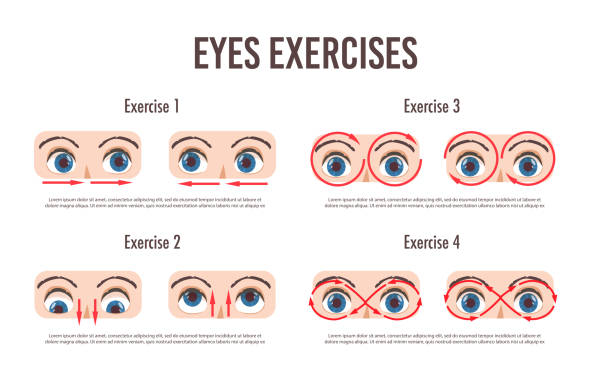Introduction
Your eyes are amazing—they work hard every day, from the moment you wake up to the time you sleep. Taking care of them naturally can protect your vision and keep them strong for years.
This post shows you how to support clear vision naturally through a holistic path that cares for your whole body, not just your eyes. You’ll discover simple habits, nutrient-rich foods, gentle eye exercises, and smart lifestyle changes that help improve focus, reduce strain, and boost long-term eye health.
Why Holistic Eye Health Matters
When you improve eyesight naturally, you’re doing more than reading letters on a chart—you’re caring for your overall health. Your eyes are closely linked to your brain, blood flow, and daily habits. A holistic approach helps:
Support long-term eye function – Keep your vision clear and sharp as you age by giving your eyes the nutrients, rest, and care they need.
Reduce digital eye strain – Protect your eyes from fatigue, dryness, and headaches caused by long hours on phones, computers, or TVs.
Avoid over-reliance on glasses or surgery – Strengthen your natural vision so you’re less dependent on corrective lenses or medical procedures.
Holistic wellness means caring for your body, mind, and habits together—not just focusing on your eyes. When you treat the whole system, your vision benefits too.

Nutrition for Healthy Eyes
Key foods for vision
Eating certain foods gives your eyes the nutrients they need to stay clear, focused, and healthy. These foods provide vitamins, minerals, and antioxidants that protect your vision from damage and aging. Try adding:
- Carrots and sweet potatoes — rich in beta-carotene, a vitamin A precursor that supports night vision and overall eye function.
- Leafy greens (spinach, kale) — full of lutein and zeaxanthin, powerful antioxidants that protect the retina from harmful light and reduce the risk of age-related eye diseases.
- Fatty fish (salmon, mackerel) — high in omega-3 fatty acids, which help reduce dry eye, improve tear production, and support the health of the eye’s surface.
- Eggs — a great source of lutein, zeaxanthin, and zinc, which work together to keep the retina strong and protect against macular degeneration.
- Citrus & berries — packed with vitamin C, important for collagen production in the eyes and for fighting oxidative stress that can damage vision over time.
Why these matter
- Lutein and zeaxanthin may help guard against age-related macular degeneration, a leading cause of vision loss in older adults. These antioxidants filter harmful blue light, protect the retina, and keep your central vision sharp. They are found in foods like spinach, kale, eggs, and corn.
- Omega-3s may lower dry eye risk and ease inflammation, helping your eyes stay comfortable and moist. These healthy fats also support the function of the retina and may reduce the risk of certain eye diseases. You can get them from fatty fish like salmon, mackerel, and sardines, or from plant sources like flaxseeds and chia seeds.
Eye-Friendly Habits & Lifestyle
Digital eye strain relief
Digital screens can strain your eyes. Use the 20-20-20 rule:
- Every 20 minutes, look at something 20 feet away for 20 seconds.
Prevent dryness:
- Blink often when using screens.
- Use a humidifier to keep air moist.
Better sleep, better vision
Your eyes need rest to recover.
- Aim for 7–9 hours of quality sleep.
- Avoid screens 1 hour before bed.
- Use blue light filters in the evening.
Stay hydrated and move
- Drink plenty of water to keep eye tissues moist.
- Exercise regularly improves blood flow to your eyes and overall brain health.

Eye Exercises & Practices
Simple exercises you can do anywhere
- Eye-rolling: Gently roll your eyes in slow circles to improve flexibility and blood flow. Do this 5 times in one direction, then switch and roll 5 times the other way. This helps relax eye muscles and ease stiffness from screen time.
- Focus shift: Hold a finger about 6 inches from your face and focus on it. Then, look at an object far away and focus there. Switch back and forth several times. This exercise strengthens your focusing ability and reduces strain from near work.
- Palming: Rub your hands together until warm, then cup them over your closed eyes without pressing. Hold for 30 seconds and relax. This blocks light, soothes your eyes, and calms your mind.
Why they work
- They reduce tension in the eye muscles and improve focus flexibility, making it easier to switch between near and far vision without strain.
- Promoting circulation helps deliver fresh nutrients and oxygen to the eyes, which supports healthy cells, repairs minor damage, and keeps vision sharp over time.
Supplements: When to Consider
Some people may need more nutrients than they can get from food.
Common eye supplements:
- Lutein + Zeaxanthin
- Omega-3 fatty acids (DHA & EPA)
- Vitamin C, E, and Zinc
Before using supplements:
- Talk to your doctor.
- Choose reputable brands with third-party testing like USP or NSF.
Protecting Your Eyes from the Environment
Sun protection
Ultraviolet (UV) light from the sun can damage your eyes over time, increasing the risk of cataracts, macular degeneration, and other vision problems.
- Wear UV-blocking sunglasses outdoors to shield your eyes from harmful rays. Look for lenses that block 100% of UVA and UVB light.
- Use a wide-brim hat for extra shade. This adds another layer of protection and reduces glare, making it easier and more comfortable to see in bright sunlight.
Safety at work & home
- Wear protective goggles when working with tools, chemicals, or sports.
- Keep indoor lighting glare-free to reduce strain.
Lifestyle Tips for Clear Vision
Try building these healthy habits to protect your vision:
- Quit smoking — Smoking raises your risk for cataracts and age-related macular degeneration. Chemicals in cigarettes can damage the blood vessels in your eyes and reduce oxygen flow.
- Control blood sugar — High blood sugar levels can harm the small blood vessels in your eyes, leading to diabetic retinopathy and vision loss. Managing your sugar through diet and medication helps keep your eyes healthy.
- Visit your eye doctor regularly — Regular eye exams catch problems like glaucoma, cataracts, and other issues early, before they cause serious damage. Early treatment helps protect your long-term vision.

Summary: Your Holistic Vision Plan
Here’s a quick recap:
Daily Vision Checklist
| Habit | Benefit |
|---|---|
| Eat eye-healthy foods | Supplies key antioxidants and vitamins |
| Protect from screens | Reduces strain, dryness |
| Practice eye exercises | Eases tension, enhances focus control |
| Use supplements wisely | Complements diet when needed |
| Shield from UV | Guards against long-term damage |
| Live mindfully | Supports whole-body and eye health |
Why This Matters
Taking care of your eyes naturally does more than just enhance your vision—it supports your overall wellness. Healthy eyes can improve your mood by reducing discomfort and headaches. Good eye care also helps improve your sleep, since eye strain and exposure to blue light can disrupt your natural rest cycles.
When your eyes feel better, your focus and productivity during the day also get a boost. Plus, small daily steps like eating right, resting your eyes, and protecting them from strain add up over time to create lasting benefits for your vision and health.
Conclusion
Clear vision naturally is within reach when you embrace a balanced, holistic plan that cares for your whole body. By eating nutrient-rich foods, you supply your eyes with the vitamins and antioxidants they need. Practicing mindful screen habits helps reduce eye strain caused by phones, computers, and TVs.
Adding protective measures like wearing UV-blocking sunglasses shields your eyes from harmful sunlight. Simple daily exercises can improve eye flexibility and focus. Together, these easy steps support your eyes every day and help keep your vision clear and healthy for the long term.
I’d love to hear from you! Share your favorite eye-healthy habit, ask a question, or post your progress below. Let’s see clearly—naturally!

